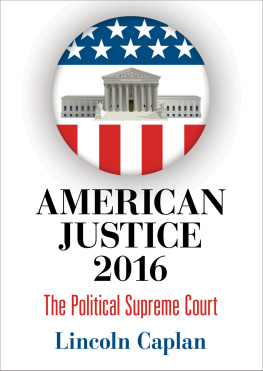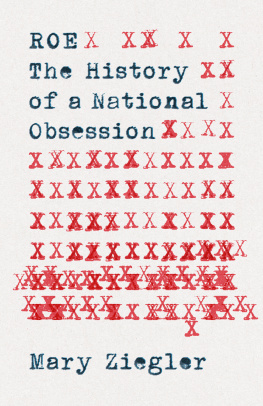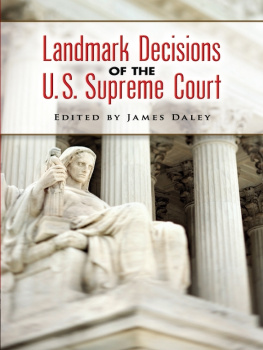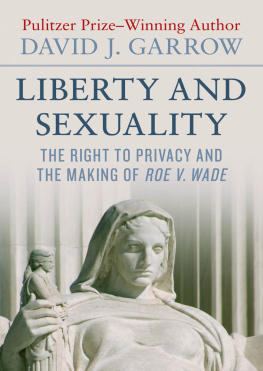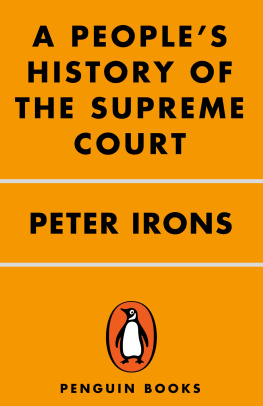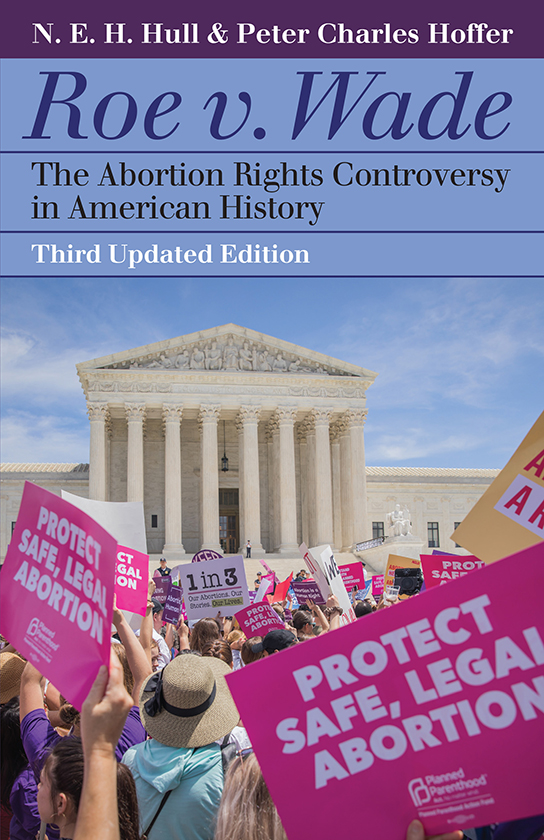Contents
Roe v. Wade
LANDMARK LAW CASES
&
AMERICAN SOCIETY
Peter Charles Hoffer
N. E. H. Hull
Williamjames Hull Hoffer
Series Editors
RECENT TITLES IN THE SERIES:
Prigg v. Pennsylvania, H. Robert Baker
The Detroit School Busing Case, Joyce A. Baugh
Lizzie Borden on Trial, Joseph A. Conforti
The Japanese American Cases, Roger Daniels
Judging the Boy Scouts of America, Richard J. Ellis
Fighting Foreclosure, John A. Fliter and Derek S. Hoff
The Passenger Cases and the Commerce Clause, Tony A. Freyer
Discrediting the Red Scare, Robert Justin Goldstein
The Great Yazoo Lands Sale , Charles F. Hobson
The Free Press Crisis of 1800, Peter Charles Hoffer
Rutgers v. Waddington, Peter Charles Hoffer
The Woman Who Dared to Vote, N. E. H. Hull
Plessy v. Ferguson , Williamjames Hull Hoffer
The Tokyo Rose Case, Yasuhide Kawashima
Gitlow v. New York, Marc Lendler
Opposing Lincoln , Thomas C. Mackey
The Supreme Court and Tribal Gaming, Ralph A. Rossum
The 9/11 Terror Cases , Allan A. Ryan
Obscenity Rules, Whitney Strub
Speaking Freely , Philippa Strum
The Campaign Finance Cases, Melvin I. Urofsky
Race, Sex, and the Freedom to Marry , Peter Wallenstein
Bush v. Gore, 3rd expanded ed., Charles L. Zelden
For a complete list of titles in the series go to www.kansaspress.ku.edu
N. E. H. HULL AND PETER CHARLES HOFFER
Roe v. Wade
The Abortion Rights Controversy
in American History
THIRD UPDATED EDITION
UNIVERSITY PRESS OF KANSAS

TO OUR BROTHERS,
DRS. LESLIE A. HULL AND BARRY J. HOFFER,
WHO UNDERSTAND HOW SCIENCE AND SOCIETY MUST
AND DO COME TOGETHER.
2001, 2010, 2021 by the University Press of Kansas
All rights reserved
Published by the University Press of Kansas (Lawrence, Kansas 66045), which was organized by the Kansas Board of Regents and is operated and funded by Emporia State University, Fort Hays State University, Kansas State University, Pittsburg State University, the University of Kansas, and Wichita State University.
Library of Congress Cataloging-in-Publication Data
Names: Hull, N. E. H., 1949author. Hoffer, Peter Charles, 1944author.
Title: Roe v. Wade : the abortion rights controversy in American history / N.E.H. Hull and Peter Charles Hoffer.
Other titles: Roe versus Wade
Description: Third updated edition. Lawrence, Kansas : University Press of Kansas, [ 2021 ] Series: Landmark law cases and American society Includes bibliographical references and index.
Identifiers: LCCN 2020048228
ISBN 9780700632459 (cloth)
ISBN 9780700631940 (paperback)
ISBN 9780700631957 (epub)
Subjects: LCSH: Roe, Jane, 19472017Trials, litigation, etc. Wade, HenryTrials, litigation, etc. Trials (Abortion)Washington (D.C.) AbortionLaw and legislationUnited StatesHistory.
Classification: LCC KF228.R59 H85 2021 DDC 342.7308/4dc23
LC record available at https://lccn.loc.gov/2020048228.
British Library Cataloguing in Publication Data is available.
Printed in the United States of America
10 9 8 7 6 5 4 3 2 1
The paper used in the print publication is recycled and contains 30 percent postconsumer waste. It is acid free and meets the minimum requirements of the American National Standard for Permanence of Paper for Printed Library Materials z39.48-1992.
CONTENTS
PREFACE TO THE THIRD EDITION
Stability in law has an intrinsic value. Lawyers and litigants can predict the outcomes of suits based on the fixity of legal doctrines and rules. Everyone can adjust their behavior to known law. That is why law reform movements in England and its colonies, as well as the United States, routinely call for codification of laws. The result is a rule-of-law system, in which outcomes are not influenced by individual status or demographic characteristics.
By contrast, when these doctrines and rules undergo rapid and unpredictable changes, lawyers and litigants suffer, as does everyone affected by law. Judges know this. Doctrines like stare decisis (let the decision stand) and res judicata (the case has already been decided) are bedrock concepts in common-law systems like our own. What then happens to the law when precedent, particularly recent precedent, is overturned; and overturned for reasons not of error or changing social and economic conditions, but for openly partisan shifts in the personnel of the courts?
The appointment of federal judges is a combination of executive discretion and congressional compliance. When presidents look for openly partisan judges and a majority of the Senate voting as a bloc to confirm the appointments is of the same political party as the president, the bench takes on a distinctly political hue. Although Chief Justice John Roberts recently stated that there are no Bush judges and Obama judges, over the course of the second decade of the twenty-first century, the chief justices claim of judicial impartiality underwent a severe test. Nowhere more than in abortion rights cases did the opinions of judges more closely align with the opinion of their appointers. The two new chapters of Roe v. Wade in this third edition trace and attempt to explain these shifts in judicial opinion.
PREFACE TO THE REVISED EDITION
In the ten years since the publication of the first edition of this book, abortion rights have continued to be one of the most hotly contended issues in American politics and law. The abortion debate is as much a litmus test in 2010 as it was in 2000, with candidates stances on Roe dictating the outcome of elections and polarizing policy debates over such widely disparate issues as religious freedom, health care reform, and criminal law. Doctors who performed abortions faced the threat of death every day. With two new chapters, a revised epilogue and conclusion, the authors have brought the story up to date, and surely no story is more important to our times than this one.
EDITORS PREFACE
Long ago, when one of the coauthors of this book (and coeditors of this series) was in graduate school, he proposed to do a seminar paper on a topic that included recent government decisions. Nonsense, retorted the instructor, a wizened and honored historian, thats current events, not history. Any history of Roe v. Wade must touch current events and so runs the risk of offending such scholarly purists. It is true that distance from events and people often gives passions a chance to cool and perspectives the opportunity to broaden. The events true significance may become clearer in the passage of time. But Roe is the exception that tests this rule, for not only has the topic of abortion remained highly politicized over the course of the past 150 years, but the terms in which the people in our study characterized the law of abortion over those years (hence the language of our primary sources) are invariably moralistic and partisan. Distance in and of itself has not lent enchantment or enlightenment to this topic.
In the latter sense, it is perhaps most fitting that Roe appear in the Landmark Law Cases and American Society series. The series has been graced by scholarly studies of a wide variety of topics whose resolution was not clear when the books were published and in some cases was not likely to be resolved, at least to everyones satisfaction, in the near future. Insofar as these cases are likely to be contested further in the courts, books like Roe tie the present and future to the past. The legal maneuvers and intellectual claims of abortions rights and antiabortion rights litigants are not new. Instead, they are part of a dialogue over gender, law, medicine, politics, and religion going back to the beginning of the republic.


